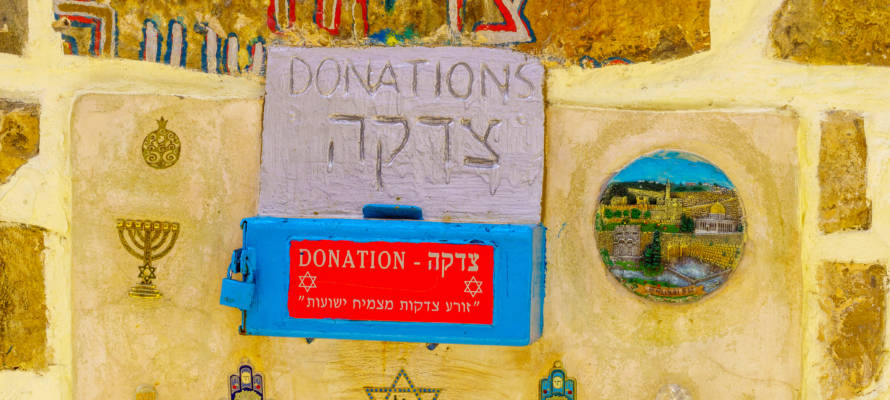Doing God’s will requires not only devoting our minds and hearts to the Creator, but also allocating our resources to fulfilling His commandments.
By Rabbi Ari Enkin, Rabbinic Director, United with Israel
In this week’s Torah portion, “Tzav” (6:1-8:36), we continue the laws of the various types of sacrifices that we began learning about last week.
There were over a dozen different types of offerings. Some were completely burned on the altar (“burnt offerings”) while others were eaten by the person who brought them or by the Kohanim (priests). Some sacrifices were animal based, others were grain based. There were water offerings and there were wine offerings, all of which included many details.
Although we don’t have a Temple nowadays, nor do we have the ability to bring an offering to God, there is still much we can learn from the sacrificial rituals.
The opening verse of the reading is quite intriguing, telling us, “And G-d spoke to Moses saying: ‘Command Aaron and his children the following: This is the law of the burnt offering…’” (Leviticus 6:1-2). The verses that follow elaborate on the details of the offering.
The commentators note that the Torah seems to speak a bit roughly toward Aaron. He is being “commanded” to follow the laws of the offering. Does Aaron need to be “commanded”? Wouldn’t a “could you please” be just as effective? Why the need for a “commandment” when it comes to the sacrifices, especially the “burnt offering” sacrifice?
It is explained that a slightly tougher request was indeed required, even for the likes of Aaron, because the burnt offering is, well, burnt to a crisp. Neither the offer-er nor the Kohen get to enjoy a good dinner out of it.
In other words, the burnt offering is a write-off. A loss of money.
It Is not the type of sacrifice that anyone would be excited to offer or for which people would naturally want to devote their resources or time. In fact, people might have the natural tendency to turn a blind eye to this offering and focus on other things. But this offering is important. It needs attention as well.
This is an important lesson on costs and financial obligations when it comes to serving God and mitzvah observance.
Being a Jew is expensive. We need to buy $100 “lemons” on Sukkot, $20 crackers for Passover, a $200 ram’s horn for Rosh Hashanah, not to mention the weekly Shabbat menu and the leather straps we wrap upon our arms every morning, all of which are far from “affordable.”
While people drive convertible sports cars, take multiple vacations each year to exotic locales, and eat out at restaurants regularly, if you tell them they need a $200 scroll for their doorposts, then they want to start cutting corners.
We have to realize that being Jewish comes with responsibilities. We also have to realize that our income is all ordained from Above. No, there is no need to buy the best or the biggest, but we should not run away from economic responsibility nor try to avoid paying the financial cost of being Jewish.
Even Aaron needed a bit of a “reminder.” And so do we.
For more insights by Rabbi Ari Enkin on this week’s Torah portion, click on the links below.
https://unitedwithisrael.org/living-torah-judge-those-who-have-sinned-with-kindness-and-compassion/
https://unitedwithisrael.org/living-torah-let-god-deal-with-the-sinners/
https://unitedwithisrael.org/living-torah-the-priority-to-show-gratitude/
https://unitedwithisrael.org/living-torah-add-excitement-to-your-prayers/
https://unitedwithisrael.org/living-torah-the-holy-temple/

HELP ISRAELIS BATTLE CORONA!
Donate to the Corona Emergency Relief Fund. Coronavirus has taken a huge toll on the people of Israel. The poor, elderly and ill are most vulnerable.
Israeli soldiers, security officers and medical care providers operate under great danger and risk to life.
Over 1 million Israelis are out of work. Many cannot make ends meet. We provide financial aid, food, medical supplies and more. Funds are distributed where needed most. The time to act is now!
United with Israel extends a special note of appreciation to the Genesis Prize for their generous support.
Send Passover Packages to Needy Israeli Soldiers - Bring Them Joy!
We are honored to thank the young men and women of the IDF who risk their lives every day to protect the citizens of Israel. Since October 7th, soldiers have been on the battlefield for months - many are hoping to come home for Passover.
Join us in sending Passover food packages (and personal notes) to Israeli soldiers and their families.
Many soldiers spend the Passover holiday with needy families back home. The soldiers greatly appreciate your love and concern. Bring them Passover joy!
CLICK HERE TO SEND YOUR PACKAGE AND NOTE TO ISRAELI SOLDIERS!




